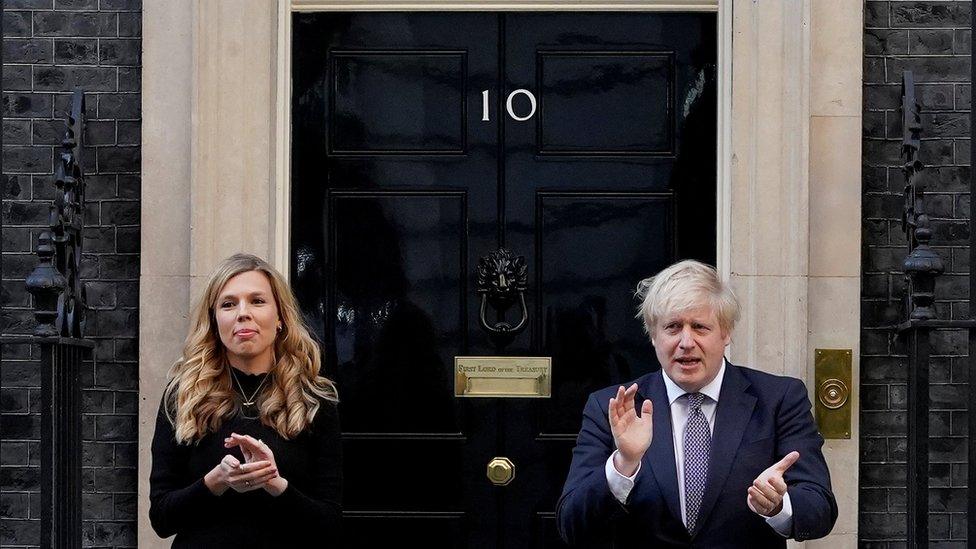Electoral Commission to investigate Boris Johnson's Downing Street flat renovations
- Published
Sir Keir Starmer offers Boris Johnson "multiple choice" answers to the question of his flat refurbishment costs
The Electoral Commission has launched an investigation into funding of works on Boris Johnson's Downing Street flat.
The spending watchdog said there were "reasonable grounds to suspect that an offence or offences may have occurred".
The PM is under growing pressure to declare how refurbishments were paid for after his ex-adviser said there was a plan for donors to "secretly pay".
Mr Johnson told MPs he had covered the revamp "personally", but would not say who had paid the initial bill.
And, speaking at the government's Covid press conference, Health Secretary Matt Hancock repeatedly refused to comment on the funding of the refurbishment, urging the media to "concentrate on the big things that really matter".
The prime minister receives an annual public grant of £30,000 to carry out renovations to his Downing Street flat each year - but newspaper reports suggest the bill for the latest renovations could be as high as £200,000.
In its investigation, the commission - the independent watchdog regulating UK political finance - will assess the Conservative Party's compliance with laws on political donations.
It will examine whether any spending on the flat falls within its remit, and if it was published as required.
The commission can impose fines if breaches are found, or pass on allegations to the police if it sees fit.
During fraught exchanges at Prime Minister's Questions, Labour leader Sir Keir Starmer pushed Mr Johnson to explain who had paid the initial invoice for renovations - asking whether it was the taxpayer, the Conservative Party, a private donor or Mr Johnson himself.
He accused the government of being "mired in sleaze, cronyism and scandal".
But Mr Johnson replied: "The answer is I have covered the costs... I conformed in full with the code of conduct and officials have kept advising me through this whole thing."
The Treasury has revealed that Chancellor Rishi Sunak, Mr Johnson's neighbour in Downing Street, also redecorated his flat last year, saying the costs were paid "upfront and entirely at his own expense".


"Baffling" - that is one cabinet source's verdict on how No 10 is handling the allegations about the renovations of the Downing Street flat.
Matt Hancock repeatedly wouldn't engage in questions on the matter, external at Wednesday's press conference.
And Boris Johnson wouldn't answer the central question in the Commons earlier during a session of Prime Minister's Questions, where he looked more red-faced and furious than I can recall.
The question is a simple one. Who paid the bill for the Downing Street flat makeover at the start?
And for as long as the PM won't answer that, the question will be asked again, and again, and again.

No 10 has also confirmed the appointment of a new independent adviser on ministers' interests.
Crossbench peer Lord Geidt will take up the role, unfilled for five months since the resignation of Sir Alex Allan in November 2020.
Sir Alex quit after Mr Johnson rejected his finding that Home Secretary Priti Patel had broken the ministerial code over bullying allegations.
Downing Street also confirmed Lord Geidt would carry out his own inquiry into the funding of the renovations and "advise the prime minister on any further registration of interests that may be needed".
However, the prime minister's spokesman later said Mr Johnson "remains the ultimate arbiter" of the ministerial code, external - setting out rules of conduct - and would decide whether to accept or reject any findings.

Carrie Symonds and Boris Johnson moved into Downing Street in 2019
The prime minister's former senior adviser, Dominic Cummings, claimed last week, external that Mr Johnson had once planned to have donors "secretly pay" for the work on his flat.
He described the move as "unethical, foolish, possibly illegal" and said the PM "almost certainly broke the rules on proper disclosure of political donations if conducted in the way he intended".
No 10 has refused to say whether the prime minister initially received a loan to cover the costs, but Downing Street has insisted the prime minister "acted in accordance with the appropriate codes of conduct and electoral law".
Refusing to answer questions on the flat at the Covid press conference, Mr Hancock said: "It is important that there are questions, and there were endless questions in the House of Commons earlier on some of the issues that you raise, and you will have seen the appointment of Lord Geidt earlier.
"But you have also got to concentrate on the big things that really matter"

What is the Electoral Commission?
Established in 2001, it is an independent body that regulates political finance in the UK, including donations to political parties.
Parties, campaigners, and other groups are required to report donations and loans over a certain amount - which are then published.
The watchdog monitors whether the rules are being followed and has powers to ensure they are enforced.
As well as being able to refer investigations to the police, it can hand out its own sanctions under the Political Parties, Elections and Referendums Act 2000.
It can issue investigation notices, disclosure orders and can carry out interviews - as well as impose fines of up to £20,000, which can increase if payments are late.
